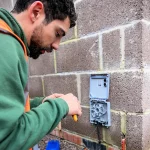East Sussex Councillors Row Over “promise” of 100% Superfast Broadband
A recent review of the state aid supported roll-out of “superfast broadband” services in East Sussex (e-Sussex) has triggered a row between Conservative and opposition Liberal Democrat councillors, which focuses upon whether or not the project ever “promised” to deliver 100% coverage.
Officially the original £34m+ e-Sussex contract, which was agreed with Openreach (BT), pledged to make “fibre broadband” (FTTC/P/Cable etc.) services available to 99% of local premises in the county (96% will get “superfast” speeds of 24Mbps+), which was allegedly completed in March 2017 (here).
The latest independent estimates from Thinkbroadband’s database suggest that 99% of premises in East Sussex are indeed covered by “fibre broadband,” although the figure drops to about 94% when looking at speeds of 24Mbps+ (rises to 95.7% if you include the city of Brighton).
Advertisement
On top of that a second Superfast Extension Programme (SEP) contract was agreed all the way back in 2015 (here), which should add another 7,000 premises to the total and this is due to complete by December 2017. A third contract is now being debated that will go even further.
ESCC Broadband Contracts
• Contract 1 (signed in May 2013) to deliver a 3 year programme of infrastructure improvements funded by ESCC £15m, Broadband Delivery UK [BDUK] £10.64m and BT £4.4m.
• Contract 2 (signed in June 2015) to deliver an infrastructure programme to provide superfast broadband coverage to a further 5,000 premises (recently increased to 7,000). The work related to this contract is taking place during 2016 and 2017, and is funded by ESCC £3m (re-invested from the first contract), BDUK £3m and BT £265,000.
However Kathryn Field, the LibDem councillor for Battle and Crowhurst, has criticised a new Scrutiny Report that was tasked with examining the first contract because she claims that ESCC had promised to deliver 100% coverage of superfast broadband (here), which so far has not been achieved. Kathryn’s view has also been echoed by other local LibDem councillors.
Councillor Kathryn Field said:
“The very last recommendation talks about creating a fact sheet to address misconceptions.
The only misconception that needs addressing is the promise and it was a promise, it was not a ‘we will try our best’, it was a promise by Councillor Jones that every single household in this county would be enabled to receive superfast broadband.
That has not happened. That is a promise that has been broken and our residents deserve better.”
In fairness the local authority deserves some of the blame for this confusion because they often used the tedious “fibre broadband” terminology to explain their aspirations and this usually gets jumbled together with the term “superfast” (24Mbps+). Crucially hybrid-fibre services, such as Openreach’s favoured Fibre-to-the-Cabinet (FTTC) technology, will in some areas deliver much slower speeds than 24Mbps (i.e. hence the difference between the 99% and 96% figures at the start of our article).
As the review itself notes, “Given that 100% coverage was merely an aspiration, it is unsurprising that public expectation had interpreted some of the “hype” surrounding initial announcements, as committed goals.”
Advertisement
Keith Glazier, Tory Councillor for Rye and Eastern Rother, added:
“Let’s be absolutely clear, when Councillor Jones made promises all those years ago he was absolutely convinced what he was saying was going to be true, but actually the world changes. The ability to deliver, as has been explained earlier, was not simple and straightforward. Let’s move on.
At the end of the day I have been leader for four years. Councillor Jones has not been a councillor for four years.
We can harp on about the past as many do or we can actually say that what we are currently delivering is a credit to the team that are undertaking this.”
The above remarks were also echoed by another Conservative councillor, Rupert Simmons, who noted that the local authority “do intend to get as close to 100 per cent as physically possible.” In fairness East Sussex currently has better coverage of superfast broadband than a lot of local authorities, although there’s clearly room for improvement, both in terms of how such progress is communicated and with regards to future network coverage.
The report itself also notes feedback from some of those who have been covered by the service, which found some all too familiar concerns.
19. Councillors and residents expressed concerns centred around broadband speeds and coverage achieved under Contract 1 delivered by BT Openreach, namely:
• Broadband speeds have not improved for some residents and small businesses, despite being connected to fibre enabled services;
• Broadband speeds are slow at peaks times of demand;
• Coverage has not reached all residents and premises and some have been left with slow or no broadband;
• In a number of cases, provision of information concerning the timing and availability of superfast broadband has been poor and precise information about when or whether superfast broadband will be provided to particular premises is not available.
The good news is that Openreach are expected to deploy more FTTP as part of Contract 2, which delivers much more reliable ultrafast speeds. Unfortunately the review doesn’t tell us anything new about the plans for Contract 3, which will focus on reaching at least some of the the c.20,000 premises that cannot currently receive a superfast service.
However we do learn that Contract 3 will prioritise those that are experiencing speeds less than 15Mbps and the service provision to any remaining business parks (the latter is difficult and so far the team has only identified two such parks).
Advertisement
Likewise the council confirms that “there may be a minority of premises, at the end of the project, which will be unable to access superfast broadband” and extra funding is expected to be set aside for these in order to help them find an alternative (e.g. satellite, mobile, fixed wireless etc.). Here’s a full list of all the recommendations.
The Recommendations
1. Further steps are taken to:
a. Communicate when faster speeds are available as the project rollout continues;
b. Provide additional advice to residents and businesses about checking speeds, selecting an ISP and information on other factors that affect broadband speeds; and
c. Make it easier for residents and businesses to check for themselves the broadband coverage and the speed they can receive.2. Details of coverage, including maps, are published at the end of Contract 2 and further information is provided to explain how and why finite funding levels may prevent the project from enabling superfast broadband access for some harder to reach premises.
3. Information is provided at the earliest opportunity outlining those premises that may not be ‘connected’ to superfast broadband and that the survey results are made available to communities and smaller suppliers to encourage the development of alternative delivery methods.
4. Once the total cost of providing superfast broadband to the remaining premises is known (or can be estimated), the Broadband Team clarifies how those premises receiving the slowest speeds will be prioritised in the context of the remaining available budget.
5. When, and if necessary, a ‘community match’ type funding programme is established for communities to bid into to pay for community based broadband schemes, in order to provide access for some of the hardest to reach premises not covered by the project, and a ‘toolkit’ is developed for communities who wish to implement their own broadband schemes.
6. Councillors, business organisations, and Parish Councils are encouraged to contact the Broadband Team with details of any Business Parks that do not have access to superfast broadband, so they can be included the in the project rollout.
7. Lessons are learnt about the management of expectations when embarking upon complex projects of this nature, and to avoid “hype” at the outset, so that there is a careful distinction between the actual projected outcomes and aspirations or vision statements.
8. A phased communications plan is developed to address the expectations of residents and businesses in the County regarding the Broadband Project and recommendations 1, 2 and 3 of the review. The plan should include enhancement of the information available, including:
a. A revision of the web site design and information so that project rollout information, frequently asked questions, and other project information is provided more clearly on the Go East Sussex, e-Sussex and ESCC web sites;
b. An information pack (including information sources to check speeds, ISP service offers and etc.) produced to assist ESCC Councillors, Parish Councils and Community Leaders when dealing with broadband issues in their Division or area; and
c. A fact sheet created to address misconceptions about the Broadband Project and some of the frequently asked questions.
Mark is a professional technology writer, IT consultant and computer engineer from Dorset (England), he also founded ISPreview in 1999 and enjoys analysing the latest telecoms and broadband developments. Find me on X (Twitter), Mastodon, Facebook, BlueSky, Threads.net and Linkedin.
« EE UK Claims First to Test “pre-standard” 5G Mobile Backhaul Capability
















































Comments are closed